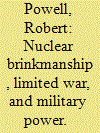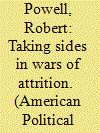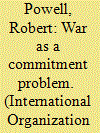| Srl | Item |
| 1 |
ID:
053134


|
|
|
| 2 |
ID:
140351


|
|
|
|
|
| Summary/Abstract |
An open question in nuclear deterrence theory is whether and how the balance of military power affects the dynamics of escalation. The balance of military strength plays virtually no role in standard accounts of brinkmanship. But this is largely by assumption and seems incompatible with an apparent trade-off between power and risk that decision makers have faced in some actual crises. This paper incorporates this trade-off in a modified model of nuclear brinkmanship. A main result is that the more likely the balance of resolve is to favor a defender, the less military power a challenger brings to bear. The model also formalizes the stability-instability paradox, showing that a less stable strategic balance, that is, a sharper trade-off between power and risk, makes conflict at high levels of violence less likely but conflict at lower levels more likely. The analysis also helps explain the incentives different states have to adopt different nuclear doctrines and force postures.
|
|
|
|
|
|
|
|
|
|
|
|
|
|
|
|
| 3 |
ID:
153564


|
|
|
|
|
| Summary/Abstract |
Behavioral IR faces a fundamental challenge. The actors in most IR models and theories are not individuals—they are aggregates like states, ministries, interest groups, political parties, and rebel factions. There are two broad approaches to attempting to integrate behavioral research about individuals. The first, a quasi-behavioral approach, makes nonstandard assumptions about the preferences, beliefs, or decision-making processes of aggregate actors. The second tries to build theories in which the key actors are individuals. Pursuing the former means that the assumptions about actors will be only weakly linked to the empirical findings propelling behavioral research. The second approach faces formidable obstacles that international relations theory has confronted for a long time and for the most part has not overcome.
|
|
|
|
|
|
|
|
|
|
|
|
|
|
|
|
| 4 |
ID:
153777


|
|
|
|
|
| Summary/Abstract |
Third parties often have a stake in the outcome of a conflict and can affect that outcome by taking sides. This article studies the factors that affect a third party's decision to take sides in a civil or interstate war by adding a third actor to a standard continuous-time war of attrition with two-sided asymmetric information. The third actor has preferences over which of the other two actors wins and for being on the winning side conditional on having taken sides. The third party also gets a flow payoff during the fighting which can be positive when fighting is profitable or negative when fighting is costly. The article makes four main contributions: First, it provides a formal framework for analyzing the effects of endogenous intervention on the duration and outcome of the conflict. Second, it identifies a “boomerang” effect that tends to make alignment decisions unpredictable and coalitions dynamically unstable. Third, it yields several clear comparative-static results. Finally, the formal analysis has implications for empirical efforts to estimate the effects of intervention, showing that there may be significant selection and identification issues.
|
|
|
|
|
|
|
|
|
|
|
|
|
|
|
|
| 5 |
ID:
070103


|
|
|
| 6 |
ID:
168534


|
|
|
|
|
| Summary/Abstract |
Recent work on counter-insurgency, client states, foreign aid, and proxy wars uses a principal–agent framework to study the principal’s ability to induce an agent to exert effort on the principal’s behalf. This work broadly emphasizes the moral hazard problem and the actors’ limited commitment power. The latter is usually addressed through the logic of repeated games in which reneging on an agreement triggers future punishment. This study analyzes a related incentive problem that undermines the principal’s ability to induce an agent to exert effort on its behalf. The repeated-game’s enforcement mechanism tends to break down if the principal is trying to get the agent to resolve a problem that, if resolved, (i) creates an ongoing problem for the agent and (ii) simultaneously significantly reduces the agent’s ability to impose future costs on the principal. The principal cannot induce the agent to exert much effort in these circumstances, and the problem persists.
|
|
|
|
|
|
|
|
|
|
|
|
|
|
|
|